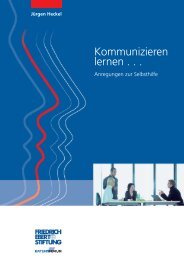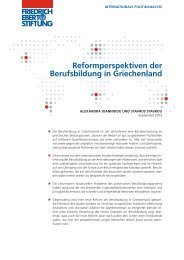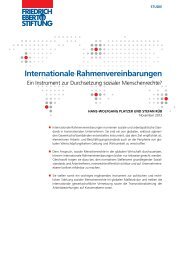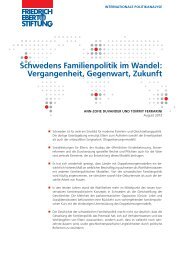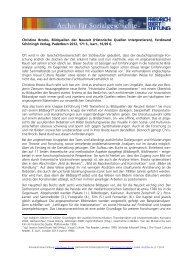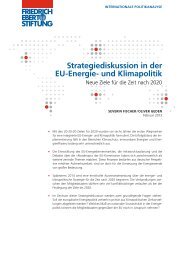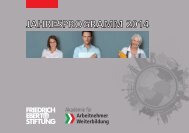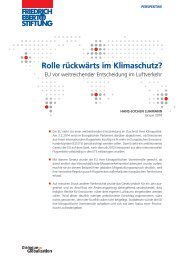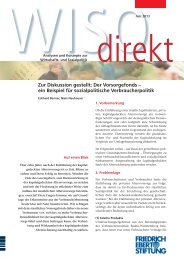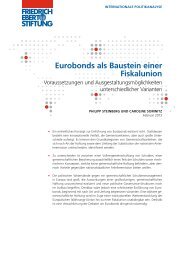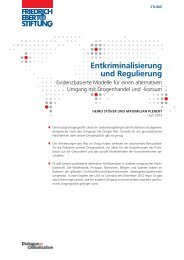Women - men - gender. - Bibliothek der Friedrich-Ebert-Stiftung
Women - men - gender. - Bibliothek der Friedrich-Ebert-Stiftung
Women - men - gender. - Bibliothek der Friedrich-Ebert-Stiftung
You also want an ePaper? Increase the reach of your titles
YUMPU automatically turns print PDFs into web optimized ePapers that Google loves.
50<br />
STRUCTURING GLOBALIZATION SOCIALLY<br />
The rediscovery of wo<strong>men</strong> – <strong>gen<strong>der</strong></strong> equality as smart economic policy?<br />
Equal rights for wo<strong>men</strong> and <strong>men</strong> are indispensable<br />
for democracy and human rights. There are very<br />
good economic reasons for this also. The unequal<br />
treat<strong>men</strong>t of <strong>men</strong> and wo<strong>men</strong> costs the global<br />
economy billions annually.<br />
The World Bank has addressed this through its<br />
Gen<strong>der</strong> Action Plan and German develop<strong>men</strong>t cooperation<br />
is also increasingly accepting the importance<br />
of instru<strong>men</strong>ts for the economic integration<br />
of wo<strong>men</strong>. Parallel to this, however, the international<br />
trade regime must provide wo<strong>men</strong> producers<br />
from the South access to markets in the<br />
North.<br />
This co-relation of “Gen<strong>der</strong> Equality as smart Economic<br />
Policy” was debated by experts from the<br />
fi eld of international develop<strong>men</strong>t cooperation at<br />
a conference in Bonn in October 2008. At the beginning<br />
of the conference, the former chairperson<br />
of the Reconstruction Loan Corporation (KfW),<br />
Ingrid Matthäus-Meier, presented the Gen<strong>der</strong> Action<br />
Plan of the World Bank. Taking four areas of<br />
action, participants discussed how far this Plan<br />
could contribute towards reduction of female poverty<br />
and increased growth of the economy, and<br />
what enabling conditions would be necessary for it<br />
to succeed.<br />
Taking China and India as examples, the wellknown<br />
com<strong>men</strong>tator on politics and current affairs,<br />
Christa Wichterich, examined how far international<br />
trade and world market integration have<br />
contributed towards creating better job and income<br />
opportunities for wo<strong>men</strong> and eliminating<br />
<strong>gen<strong>der</strong></strong>-imbalances. In the case of both countries,<br />
the fi ndings demonstrated that although new jobs<br />
and, therefore, new opportunities for wo<strong>men</strong> did<br />
emerge, yet there was an enormous disparity in<br />
income in society in general, and also between<br />
wo<strong>men</strong><br />
The third presentation by Ulrike Chini of Oikocredit<br />
focused on the role of micro-credits for<br />
wo<strong>men</strong> in achieving develop<strong>men</strong>t. Micro-credits<br />
can help in acquiring qualifi cations, securing income,<br />
education and health, increasing purchasing<br />
power, creating more job opportunities and promoting<br />
the regional economy, provided conducive,<br />
enabling conditions exist. These include professional<br />
micro-fi nancing institutions, a holistic approach,<br />
that is, loans as a component of develop<strong>men</strong>t<br />
work, training and consultancy, the participation<br />
of wo<strong>men</strong> borrowers and the provision of<br />
additional fi nancial services.<br />
In the last section, the central issue was, whether<br />
economic empower<strong>men</strong>t can help achieve the millennium<br />
develop<strong>men</strong>t goals and to what extent.<br />
Marita Steinke, division head at the Fe<strong>der</strong>al Ministry<br />
for Economic Cooperation and Develop<strong>men</strong>t,<br />
drew attention to the fact that focusing on the<br />
MDGs had once again revealed where the defi cits<br />
in the individual areas lay, and she further informed,<br />
that indicators had been developed to<br />
measure the achieve<strong>men</strong>t of the goals. Further instru<strong>men</strong>ts,<br />
such as the Gen<strong>der</strong> Action Plan of the<br />
World Bank and regional approaches, such as the<br />
Maputo and SADC Protocols also contribute to the<br />
attain<strong>men</strong>t of the goals. At the same time, however,<br />
economic change must go hand in hand with<br />
social change, so that, for example, the lack of<br />
property law or the state laws do not become<br />
obstacles to economic empower<strong>men</strong>t.



